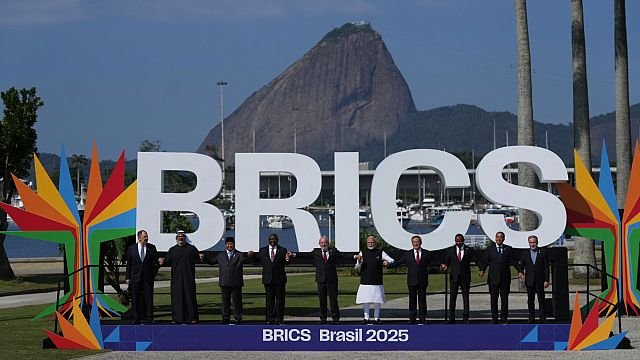[[{“value”:”
Brazil
US President Donald Trump is threatening to impose an additional 10 percent tariff on nations that align themselves with what he called the “anti-American policies” of the BRICS bloc of emerging economies.
In a post on social media on Sunday, Trump wrote: “Any country aligning themselves with the Anti-American policies of BRICS, will be charged an ADDITIONAL 10% tariff. There will be no exceptions to this policy.”
The deadline for countries to agree on tariff deals with the US has been set for 9 July, with the new tariffs to take effect on 1 August.
At last year’s BRICs summit hosted by Russia in Kazan, the Kremlin initiated efforts to develop alternatives to US-dominated payment systems. That would allow Moscow to dodge Western sanctions imposed after Russia’s invasion of Ukraine in 2022.
As the group meets again in Brazil, the focus is on less controversial issues, such as promoting trade relations between members and global health. Analysts say Brazil doesn’t want to draw the attention of Washington and expose its economy to any risk, now that Donald Trump is back in the White House.
Brazil’s President Luiz Inácio Lula da Silva has some of his priorities, such as debates on artificial intelligence and climate change, front and center for the talks with key leaders not in attendance.
Lula said in his speech on Sunday that “we are witnessing the unparallel collapse of multilateralism” and that the meeting is taking place “in the most adverse global scenario” of the four times Brazil has hosted it.
He called for the group to promote peace and mediate conflicts. “If international governance does not reflect the new multipolar reality of the 21st century, it is up to BRICS to contribute to its renovation,” Lula said at the opening of the summit.
Rapid expansion
BRICS was founded by Brazil, Russia, India, China and South Africa, but the group last year expanded to include Indonesia, Iran, Egypt, Ethiopia, and the United Arab Emirates.
As well as new members, the bloc has 10 strategic partner countries, a category created at last year’s summit that includes Belarus, Cuba and Vietnam.
Because of that rapid expansion, housekeeping issues are topping the agenda, to better integrate new members and boost internal cohesion. Analysts and diplomats say any lack of cohesion in an enlarged BRICS may affect its ability to become another pole in world affairs.
Despite the absence of the Russian and Chinese leaders, the summit is important for attendees, especially in the context of instability provoked by Trump’s tariff wars, said Bruce Scheidl, a researcher at the University of Sao Paulo’s BRICS study group.
“The summit offers the best opportunity for emerging countries to respond, in the sense of seeking alternatives and diversifying their economic partnerships,” Scheidl said.
For President Lula, the summit is a welcome pause from a difficult domestic scenario, marked by a drop in popularity and conflict with Congress.
The meeting was also an opportunity to advance climate negotiations and commitments on protecting the environment before November’s COP 30 climate talks in the Amazonian city of Belem.
You may also like
From the same country
“}]] Africanews RSS

